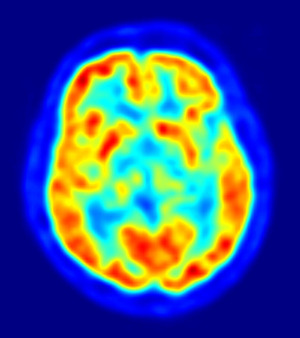por
Brendon Nafziger, DOTmed News Associate Editor | February 14, 2012
PET scans using the biomarker FDDNP can help predict cognitive decline in older adults, according to a new study.
University of California, Los Angeles researchers reporting in the current issue of Archives of Neurology suggested the FDDNP scans might also be useful in pinpointing adults with mild cognitive impairment who are at risk for Alzheimer's disease, and could even be used to gauge the effectiveness of new therapies.
"We found that increases in FDDNP binding in key brain areas correlated with increases in clinical symptoms over time," study author and UCLA medical and molecular pharmacology professor Dr. Jorge R. Barrio said in a statement.
The imaging agent FDDNP, technically known as 2-(1-{6-[(2-fluorine 18-labeled fluoroethyl)methylamino]-2-napthyl}ethylidene) malononitrile, binds to plaque deposits and tau tangles which autopsies suggest are linked with Alzheimer's disease. The same UCLA team had shown in a study two years ago that older patients and those who were carriers of a genetic variant increasing their risk for Alzheimer's had higher concentrations of the agent in certain parts of their brains.
In the current study, the researchers took brain scans and gave a battery of cognitive performance tests to 43 adults, with a median age of 64, 21 of whom already had mild cognitive impairment. The researchers then followed up with the patients two years later.
At the follow-up, the researchers said binding of FDDNP in the frontal and posterior cingulate regions of the brain, as well as across the entire brain, was linked with memory decline. Higher levels of binding at baseline (the first scans) was also linked with later cognitive decline across five domains, including "language, attention, executive, and visuospatial abilities," the researchers said.
However, for patients with mild cognitive impairment, binding to the frontal and parietal areas produced the "greatest diagnostic accuracy" in revealing patients who would go on to receive an Alzheimer's disease diagnosis two years later, the researchers said. Six of the 21 MCI patients eventually got an Alzheimer's diagnosis, the researchers said, and they had higher baseline frontal and parietal FDDNP binding values.
In a release, UCLA said the researchers got Food and Drug Administration permission to run a study with FDDNP testing the brain-protective effects of a "high potency" form of the curry spice curcumin, alleged to have tau tangle-busting abilities. UCLA, which holds three patents on FDDNP, also said it was looking for commercial partners to bring the agent to market.
Back to HCB News
